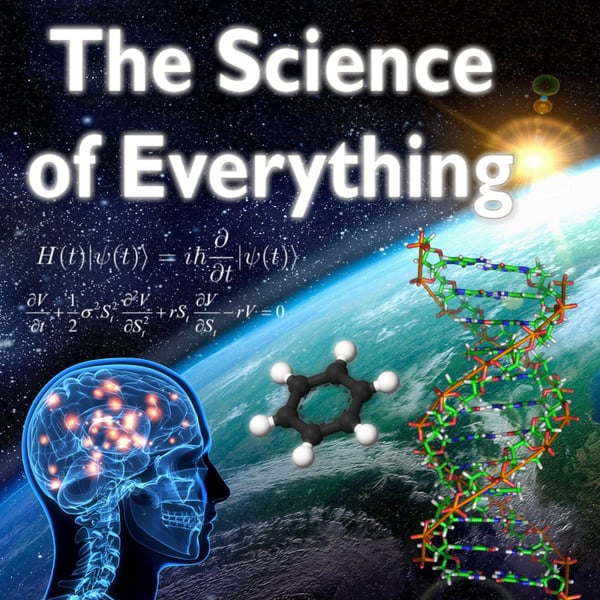Episode 84: Advanced Quantum Mechanics Part II
The Science of Everything Podcast
James Fodor
4.8 • 750 Ratings
🗓️ 7 July 2017
⏱️ 45 minutes
🧾️ Download transcript
Summary
Transcript
Click on a timestamp to play from that location
| 0:00.0 | Oh, wow, oh, oh, wow, oh, wow, oh, wow. |
| 0:13.0 | Oh, wow. |
| 0:15.0 | Oh, my. Hello, you're listening to The Science of Everything podcast episode 84, Advanced Quantum Mechanics Part 2. |
| 0:40.8 | I'm your host, James Fodor. |
| 0:42.5 | So this episode follows directly from the previous episode, Advanced Quantum Mechanics, part one, |
| 0:47.8 | which turned out to be longer than I'd expected, so I've split into two episodes. |
| 0:52.0 | That's definitely recommended pre-listing for this episode. |
| 0:55.7 | In this show, what I want to talk about are some more advanced ideas in quantum mechanics, |
| 1:00.0 | including Noethus theorem, particle statistics, perturbation theory, |
| 1:04.7 | and a little bit about the EPR paradox. |
| 1:07.1 | So these are some of the more juicy concepts, |
| 1:10.1 | which require a little bit of background to sort of understand. |
| 1:13.6 | Hopefully you'll find this interesting, but do be warned that these are some relatively advanced topics, |
| 1:18.6 | so it may be heavy-going if you don't already have some background in QM, |
| 1:22.6 | which is why I recommend the previous episode and also the principles of quantum mechanics episodes |
| 1:28.3 | that I think episode 14 that I did some time back. Okay so let's get into it. |
| 1:34.3 | In the previous episode I outlined as best as I could without any visual aids |
| 1:40.3 | the core ideas of Dirac's Brachette formalism of quantum mechanics, and the basic idea of being |
| 1:46.4 | able to represent an arbitrary quantum system as a superposition of eigenstates, and each |
| 1:53.1 | eigenstate corresponding to some measurable observable. |
| 1:57.7 | Now, I'm not directly going to continue on from that, but I'm going to assume that as sort of background in the discussion that follows, and some of the things I talk about will require more than others. But basically, now I'm going to introduce some key ideas that are pertinent to a more advanced study of quantum mechanics, and that are just interesting in their own light. So the first I'm going to talk about is Nertha's theorem. |
| 2:20.0 | Now, Nertha was a mathematician who was, well, obviously responsible for NERtha's theorem |
... |
Please login to see the full transcript.
Disclaimer: The podcast and artwork embedded on this page are from James Fodor, and are the property of its owner and not affiliated with or endorsed by Tapesearch.
Generated transcripts are the property of James Fodor and are distributed freely under the Fair Use doctrine. Transcripts generated by Tapesearch are not guaranteed to be accurate.
Copyright © Tapesearch 2025.

